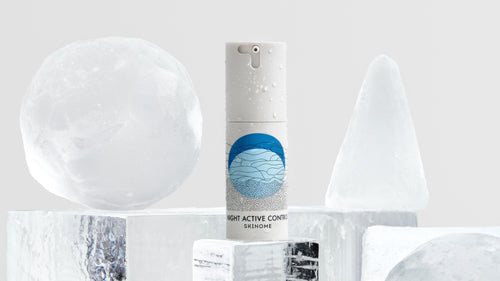SUBSCRIBE & SAVE 20%
FREE SHIPPING
Remember your password?
Subscribe to receive a guaranteed shipment of formula every month.
Enjoy a {{ discount_amount }} discount on products throughout your subscription.
Change or cancel your subscription at any time!


Although in this article we will focus on prebiotics, we want to start by explaining what the general term "biotics" stands for. The definition of 'biotics' includes prebiotics, probiotics and postbiotics, all of which are used to enrich and balance our microbiome. It is important to remember that our skin health is not only affected by what we apply to our skin, but also the type of food we eat, which will be discussed in more detail in this article.
Prebiotics are a group of nutrients that act as nourishment for our beneficial bacteria in the gut and skin. The most common prebiotics are carbohydrates, which can have different forms, e.g. sugars, fiber and starch.
Previous studies have shown that prebiotics have several benefits for our gastrointestinal health and have been reported to have a positive impact on other organs, e.g. the immune system and the central nervous system.
Prebiotic treatment has also been shown to have great potential in the treatment of various skin conditions, e.g. atopic eczema, eczema, dermatitis and acne. To illustrate this, researchers Foolad and Armstrong conducted a study in which infants received a formula that consisted of 90% GOS (galacto-oligosaccharides) and 10% long-chain FOS (fructo-oligosaccharides). The research results showed a reduced incidence of atopic eczema in children from the risk group. In a similar study conducted by the researcher Bunselmeyer in 2006, a connection was discovered between prebiotics and the increase in bifidobacteria that affect the severity of atopic eczema.
There is also scientific evidence that prebiotics have a positive effect on our skin health, for example by retaining moisture. This was reflected in an experiment developed by Kano and team, in which 40 female volunteers were given either a bottle of probiotic and prebiotic milk or non-fermented milk that contained neither probiotics nor prebiotics. The study showed that in comparison to the active group, the hydration in the outermost skin layer (stratum corneum) of the control group participants was significantly lower (p = 0.031). Furthermore, researchers Ghazzewi and Tester indicate that prebiotics have a positive effect on the skin, as they balance the immune system and have shown promising results in the treatment of atopic diseases.




How then can we get prebiotics? The good news is that this specific group of biotics can be found in both food and skin care products.
Let's start with the food! Prebiotics are found in various foods, such as onions, garlic, artichokes, asparagus, sugar beets, unripe bananas, oatmeal, cold potatoes, corn, wheat, honey, barley, tomatoes, rye, soybeans, seaweed and microalgae.
The most common prebiotics in skin care products are inulin, glucomannan, oligosaccharides, xylitol, rhamnose. These ingredients help the skin maintain balance and optimal microbiome health.


Prebiotics in Skinome's products
The prebiotic element found in Skinome's products is Alpha Glucan Oligosaccharide which stimulates the growth of beneficial bacteria on the skin and prevents unwanted microorganisms. In addition, it stimulates the skin's defenses and moisturizes the skin. You can find this ingredient in our products:
Our Night Active Retinol contains e.g. prebiotics and skin-specific retinol as our focus is to mimic the skin's natural composition as much as possible. Night Active Retinol suits normal to dry skin best.
Our Night Active Control also contains prebiotics and skin-friendly retinol as our focus is to mimic the skin's natural composition as much as possible. Night Active Control suits normal skin but also oily and acne-prone skin.
Al-Ghazzewi, FH, & Tester, RF (2014). Impact of prebiotics and probiotics on skin health. Beneficial microbes, 5(2), 99–107. https://doi.org/10.3920/BM2013.0040.
Bockmühl D, Jasoy C, Nieveler S, Scholtyssek R, Wadle A, Waldmann-Laue M. Prebiotic cosmetics: an alternative to antibacterial products. IFSSC Mag 2006;9:1–5.
Bunselmeyer B. (2006). Probiotika und Präbiotika zur Prävention und Therapie des atopischen Ekzems [Probiotics and prebiotics for the prevention and treatment of atopic eczema]. Der Hautarzt; Zeitschrift fur Dermatology, Venerologie, und verwandte Gebiete, 57(9), 785–791. https://doi.org/10.1007/s00105-005-1034-2.
Dall'Oglio, F., Milani, M., & Micali, G. (2018). Effects of oral supplementation with FOS and GOS prebiotics in women with adult acne: the "SO Sweet" study: a proof-of-concept pilot trial. Clinical, cosmetic and investigational dermatology, 11, 445–449. https://doi.org/10.2147/CCID.S179627.
Davani-Davari D, Negahdaripour M, Karimzadeh I, et al. Prebiotics: Definition, Types, Sources, Mechanisms, and Clinical Applications. Foods. 2019;8(3):92. Published 2019 Mar 9. doi:10.3390/foods8030092.
Foolad N, Armstrong AW. Prebiotics and probiotics: the prevention and reduction in severity of atopic dermatitis in children. Beneficial Microbes. 2014;5(2):151–60. Epub 2014/01/28.
Gillbro Johanna. The Scandinavian Skincare Bible. 2020. Scribe Publications. ISBN: 9781912854943.
Holland KT, Bojar RA. Cosmetics. What is their influence on the skin microflora? Am J Clin Dermatol 2002;3:445–9.
Kano M, Masauoka N, Kaga C, Sugimoto S, Iizuka R, Manabe K, Sone T, Oeda K, Nonaka C, Miazaki K, Ishikawa F (2013) Consecutive intake of fermented milk containing Bifidobacterium breve strain yakult and galacto-oligosaccharides benefits skin condition in healthy adult women. Biosci Microbiota Food Health 32:33–39.
Maguire, M., & Maguire, G. (2017). The role of microbiota, and probiotics and prebiotics in skin health. Archives of dermatological research, 309(6), 411–421. https://doi.org/10.1007/s00403-017-1750-3.
Ouwehand, Arthur & Tiihonen, Kirsti & Lahtinen, Sampo. (2010). The Potential of Probiotics and Prebiotics for Skin Health. 10.1007/978-3-540-89656-2_77. Pages: 1300.